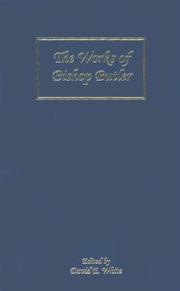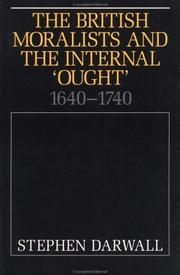| Listing 11 - 16 of 16 | << page >> |
Sort by
|
Book
Year: 1936 Publisher: New York Macmillan
Abstract | Keywords | Export | Availability | Bookmark
 Loading...
Loading...Choose an application
- Reference Manager
- EndNote
- RefWorks (Direct export to RefWorks)
Religious thought --- Butler, Joseph --- Anglican churches --- Butler --- Joseph --- 1692-1752 --- England --- Great Britain
Book
ISBN: 9789819999033 9819999030 Year: 2024 Publisher: Singapore : Springer Nature Singapore : Imprint: Springer,
Abstract | Keywords | Export | Availability | Bookmark
 Loading...
Loading...Choose an application
- Reference Manager
- EndNote
- RefWorks (Direct export to RefWorks)
This book is the first English-language monograph about Bishop Joseph Butler (1692–1752) by Japanese scholars. It is an especially interesting and controversial message coming as it does from Japan, a well-developed secular economic state where less than 1% of the population are Christians and opposing the recent trend of curtailing the eighteenth-century political economy into religiosity and theology. This multidisciplinary edited book presents a different and new perspective from the recent work of Oslington et al., which seeks to reduce the political economy of eighteenth- and nineteenth-century Britain to religiosity and theology, triggered by the writings of A. M. C. Waterman. Unlike those works, the present one aims to re-examine the largely forgotten Butler, who was said in the nineteenth century to be the most influential cleric and preacher in the Church of England of the previous century— not just as a clerical ideologue, but mainly as a proto-political economist before Adam Smith. In order to achieve this goal, first, the authors clarify that Butler's theory of conscience and probability, which began with passion and selfishness, was created with the development of eighteenth-century commercial society in mind. Second, the manner in which Butler's discourse was directed not at anti-Anglicans or eminent intellectuals, but at the majority of ordinary secular society, is explored. How it was consistent with and defended their sentiments and economic behavior, not only in Analogy but mainly in Fifteen Sermons, is also investigated and explained. Finally, readers see that Butler's antirational grasp of humanity and empiricist epistemology, based on “probability” presented in these inquiries, can in fact be considered a pioneering expression of the methodological premises of modern economics.
Economics --- Economists --- Butler, Joseph, --- Church of England --- Clergy --- Economic history. --- Economics. --- Economic History. --- Political Economy and Economic Systems.

ISBN: 9781580462105 9781580466592 1580462103 9786611770761 1281770760 1580466591 Year: 2006 Publisher: Rochester University of Rochester Press
Abstract | Keywords | Export | Availability | Bookmark
 Loading...
Loading...Choose an application
- Reference Manager
- EndNote
- RefWorks (Direct export to RefWorks)
This edition of Bishop Joseph Butler's [1692-1752] complete works is the first newly edited version to appear in a century, and is the only one to include a single, analytic index to the whole works. The editor's introduction presents Butler's ethics and philosophy of religion as a single, comprehensive system of pastoral philosophy and surveys the vast influence Butler exerted, especially in the nineteenth century.
Included here are all fifteen published sermons from Butler's tenure as Preacher at the Rolls Chapel, the only sermons in English routinely studied by secular ethicists to this day; six additional sermons on the great public institutions; his Charge to the Clergy at Durham, controversial in its day for its defense of external religion; his youthful letters sent anonymously to Samuel Clarke, and the complete text of his Analogy of Religion, an apologetic tour de force, including the famous introduction on probability as the guide to life, the analogical defense of immortality, free will and the moral order of nature, as well as his famous rebuttal of deism and his dissertations on virtue and on personal identify.
Butler's work is among the monuments of classical Anglican theology. He is a major source for work in ethical theory and philosophy of religion, as well as for the background of Victorian literature.
David E. White teaches philosophy at St. John Fisher College and is an officer in the New York State Philosophical Association.
Butler, Joseph --- Sermons, English --- -252 --- English sermons --- Sermoenen. Predikaties. Preekbundels --- -Sermons, English --- 252 Sermoenen. Predikaties. Preekbundels --- 252 --- Church of England --- Anglican Church --- Anglikanskai︠a︡ t︠s︡erkovʹ --- Ecclesia Anglicana --- Kirche von England --- United Church of England and Ireland --- Bishop Butler. --- classical Anglican theology. --- ethics. --- nineteenth century. --- philosophy of religion.
Book
ISBN: 128101690X 9786613772206 1846159393 1843836122 Year: 2011 Publisher: Woodbridge ; Rochester, NY : Boydell Press,
Abstract | Keywords | Export | Availability | Bookmark
 Loading...
Loading...Choose an application
- Reference Manager
- EndNote
- RefWorks (Direct export to RefWorks)
Joseph Butler [1692-1752] is perhaps Britain's most powerful and original moral philosopher. He exercised a profound influence over the contemporary Protestant Churches, the English moralists and the Scottish philosophical school but his theory of the "affections", grounded in Newtonian metaphysics and presenting an account of human psychology, also set the terms of engagement with questions of education, slavery, missions and even labour relations. In the nineteenth-century English-speaking world he was an authority of first resort for Evangelicals, Tractarians, philosophers, scientists, psychologists, economists, sociologists, lawyers and educationalists alike. He remains a key reference point for modern American and British philosophers, from Broad to Rawls and beyond.
Many analyses of Butler, however, have been distorted by aggressively secular readings.
This book is based on a comprehensive reassessment of his published work and the surviving manuscripts and archival materials. These are set within an account of his spiritual and intellectual development and his ministerial vocation, from the protracted and painful process of conforming to the Church of England to his initial observations on a social philosophy.
Demonstrating that even The Analogy originated in liturgical preaching, this book offers a refreshed and detailed account of Butler's key terms - conscience, consciousness, identity, affections, charity, analogy, probability, tendency - and suggests that exploration of his methods may contribute to modern thinking about ethics, language, the role of the Church, and the religion and science debates.
BOB TENNANT taught English Literature at the University of Sussex, spent many years as a senior manager in adult education, and was a trade union and political activist serving leading organisations at local, regional and national levels. He has written on political, economic and trade union matters for many newspapers and periodicals and is a founder of The British Pulpit Online, seeking to create an online catalogue and database of all printed British sermons from 1660 to 1901.
Ethics. --- Conscience --- Consciousness --- Deontology --- Ethics, Primitive --- Ethology --- Moral philosophy --- Morality --- Morals --- Philosophy, Moral --- Science, Moral --- Philosophy --- Values --- Religious aspects --- Christianity. --- Religious aspects. --- Butler, Joseph, --- Church. --- Education. --- English Moralists. --- Human Psychology. --- Joseph Butler. --- Labour Relations. --- Missions. --- Moral Philosopher. --- Newtonian Metaphysics. --- Religion. --- Science. --- Slavery.
Book
ISBN: 183998628X 1839986298 1839986271 Year: 2022 Publisher: London : Anthem Press,
Abstract | Keywords | Export | Availability | Bookmark
 Loading...
Loading...Choose an application
- Reference Manager
- EndNote
- RefWorks (Direct export to RefWorks)
The Importance of Sentiment in Promoting Reasonableness in Children explores the contributions that eighteenth-century Scottish philosophers Thomas Reid, Adam Smith, and David Hume make to our understanding of important factors in the development of children as they gradually acquire central features of reasonableness. Smith and Reid explicitly discuss the importance of sentiment and reason in the development of children. Their views are favorably influenced by the writings of their English predecessor Joseph Butler. Hume, too, valued much of Butler's thinking. But, unlike Smith and Reid, he said little about Butler's specific reflections on sentiment and reason. Despite this, one of the aims of this little book is to show that each contributes to our understanding today of what the encouragement of the philosophical thinking of children can play in helping them to come to an appreciation of reasonableness. They advocate a social environment for children that moves them to mix sentiment and reason in ways that support the values of reasonableness.
Child psychology. --- Moral development. --- Moral education. --- Character education --- Ethical education --- Child rearing --- Education --- Ethics --- Religious education --- Ethical development --- Child psychology --- Moral education --- Faith development --- Behavior, Child --- Child behavior --- Child study --- Children --- Pediatric psychology --- Child development --- Developmental psychology --- Psychology --- Reasoning in children. --- Sentimentalism. --- Philosophy. --- Reid, Thomas, --- Smith, Adam, --- Hume, David, --- Butler, Joseph,

ISBN: 0521451671 0521457823 0511608950 Year: 1995 Publisher: Cambridge : Cambridge university press,
Abstract | Keywords | Export | Availability | Bookmark
 Loading...
Loading...Choose an application
- Reference Manager
- EndNote
- RefWorks (Direct export to RefWorks)
This book is a major work in the history of ethics, and provides the first study of early modern British philosophy in several decades. Professor Darwall discerns two distinct traditions feeding into the moral philosophy of the seventeenth and eighteenth centuries. On the one hand, there is the empirical, naturalist tradition, comprising Hobbes, Locke, Cumberland, Hutcheson, and Hume, which argues that obligation is the practical force that empirical discoveries acquire in the process of deliberation. On the other hand, there is a group including Cudworth, Shaftesbury, Butler, and in some moments Locke, which views obligation as inconceivable without autonomy and which seeks to develop a theory of the will as self-determining.
Philosophy, British --- Ethics, Modern --- Ethics --- Philosophie britannique --- Morale moderne --- Morale --- History --- Histoire --- #GBIB:Overlegcentrum Christelijke Ethiek --- 17 <09> --- Geschiedenis van de moraal --- 17 <09> Geschiedenis van de moraal --- General ethics --- anno 1600-1699 --- anno 1700-1799 --- Great Britain --- Philosophy [British ] --- 18th century --- Ethics [Modern ] --- 17th century --- History of philosophy --- Shaftesbury, of, Anthony A.C. --- Butler, Joseph --- Hobbes, Thomas --- Masham, Damaris Cudworth --- Culverwell, Nathaniel --- Hutcheson, Francis --- Hume, David --- Locke, John --- Arts and Humanities --- Philosophy
| Listing 11 - 16 of 16 | << page >> |
Sort by
|

 Search
Search Feedback
Feedback About UniCat
About UniCat  Help
Help News
News